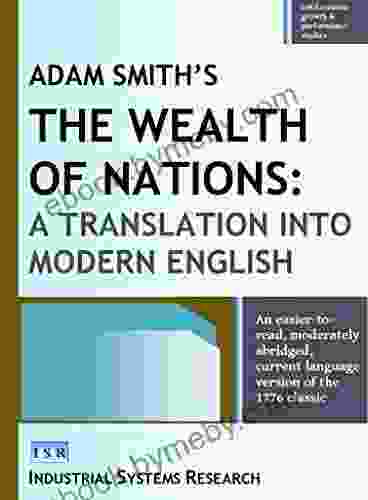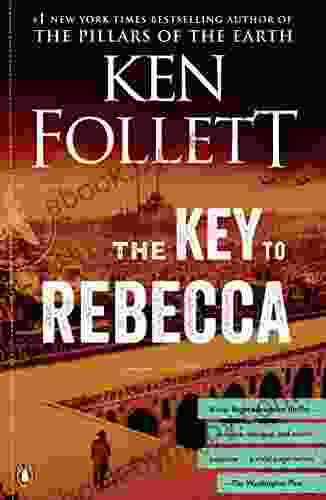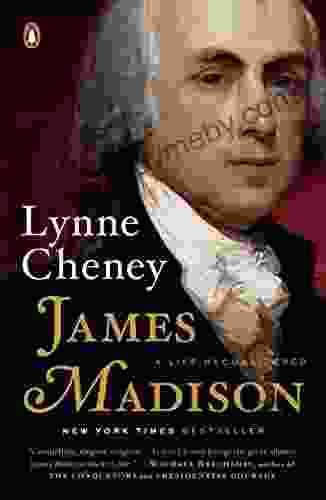James Madison: A Life Reconsidered

James Madison, the fourth President of the United States, is one of the most important figures in American history. He was a key architect of the Constitution and the Bill of Rights, and he played a leading role in the War of 1812. Despite his many accomplishments, Madison has often been overshadowed by his more famous contemporaries, such as George Washington and Thomas Jefferson. In this new biography, biographer Robert A. Rutland seeks to give Madison his due, arguing that he was a brilliant and complex man who deserves to be remembered as one of the greatest presidents in American history.
4.6 out of 5
| Language | : | English |
| File size | : | 14159 KB |
| Text-to-Speech | : | Enabled |
| Screen Reader | : | Supported |
| Enhanced typesetting | : | Enabled |
| X-Ray | : | Enabled |
| Word Wise | : | Enabled |
| Print length | : | 578 pages |
Rutland's biography is based on extensive research, including new material from the James Madison Papers at the University of Virginia. He provides a detailed account of Madison's life, from his childhood in Virginia to his death in 1836. Rutland also offers a fresh perspective on Madison's political career, arguing that he was a more pragmatic and less ideological figure than has often been portrayed.
Rutland's biography is a major contribution to the study of James Madison and American history. It is a well-written and engaging account of a complex and fascinating man. Rutland's work will be of interest to scholars, students, and general readers alike.
Table of Contents
- Chapter 1: The Making of a Statesman
- Chapter 2: The Constitutional Convention
- Chapter 3: The Bill of Rights
- Chapter 4: The Presidency
- Chapter 5: The War of 1812
- Chapter 6: The Retirement Years
Chapter 1: The Making of a Statesman
James Madison was born in Port Conway, Virginia, on March 16, 1751. He was the eldest of twelve children born to James Madison Sr., a planter, and Eleanor Conway Madison. Madison's family was wealthy and influential, and he received a privileged education. He attended the College of New Jersey (now Princeton University) and graduated in 1771. After graduating from college, Madison studied law and was admitted to the Virginia bar in 1776.
Madison's political career began in 1776, when he was elected to the Virginia House of Delegates. He served in the House of Delegates for five years, and during that time he emerged as a leading advocate for religious freedom and individual rights. In 1780, Madison was elected to the Continental Congress. He served in the Continental Congress for four years, and during that time he played a key role in drafting the Articles of Confederation, the first constitution of the United States.
Chapter 2: The Constitutional Convention
In 1787, Madison was a delegate to the Constitutional Convention. The Constitutional Convention was held in Philadelphia, Pennsylvania, and its purpose was to revise the Articles of Confederation. Madison played a leading role in the Constitutional Convention, and he was one of the principal authors of the Constitution. The Constitution was ratified by the states in 1788, and Madison was elected to the first Congress under the new Constitution.
Chapter 3: The Bill of Rights
After the Constitution was ratified, Madison worked to add a Bill of Rights to the Constitution. The Bill of Rights was a series of ten amendments to the Constitution that guaranteed individual rights such as freedom of speech, religion, and the press. Madison believed that the Bill of Rights was essential to protect the liberties of the American people. The Bill of Rights was ratified by the states in 1791.
Chapter 4: The Presidency
In 1808, Madison was elected President of the United States. He served as President for eight years, and during that time he oversaw the Louisiana Free Download and the War of 1812. The Louisiana Free Download doubled the size of the United States, and it gave the United States control of the Mississippi River. The War of 1812 was fought between the United States and Great Britain. The war ended in a draw, but it helped to establish the United States as an independent nation.
Chapter 5: The War of 1812
The War of 1812 was a major turning point in Madison's presidency. The war was unpopular with many Americans, and it led to Madison's defeat in the 1812 presidential election. After the war, Madison retired to his home in Montpelier, Virginia. He continued to be active in public life, and he served as a regent of the University of Virginia from 1826 to 1836.
Chapter 6: The Retirement Years
Madison died at Montpelier on June 28, 1836. He was eighty-five years old. Madison was a brilliant and complex man who made significant contributions to American history. He was a key architect of the Constitution and the Bill of Rights, and he played a leading role in the War of 1812. Madison's legacy is one of a statesman who dedicated his life to the service of his country.
James Madison was a remarkable man who left a lasting legacy on the United States. He was a brilliant statesman, a gifted writer, and a dedicated public servant. Madison's work helped to shape the United States into the nation it is today, and his legacy continues to inspire Americans today.
4.6 out of 5
| Language | : | English |
| File size | : | 14159 KB |
| Text-to-Speech | : | Enabled |
| Screen Reader | : | Supported |
| Enhanced typesetting | : | Enabled |
| X-Ray | : | Enabled |
| Word Wise | : | Enabled |
| Print length | : | 578 pages |
Do you want to contribute by writing guest posts on this blog?
Please contact us and send us a resume of previous articles that you have written.
 Book
Book Novel
Novel Page
Page Chapter
Chapter Text
Text Story
Story Genre
Genre Reader
Reader Library
Library Paperback
Paperback E-book
E-book Magazine
Magazine Newspaper
Newspaper Paragraph
Paragraph Sentence
Sentence Bookmark
Bookmark Shelf
Shelf Glossary
Glossary Bibliography
Bibliography Foreword
Foreword Preface
Preface Synopsis
Synopsis Annotation
Annotation Footnote
Footnote Manuscript
Manuscript Scroll
Scroll Codex
Codex Tome
Tome Bestseller
Bestseller Classics
Classics Library card
Library card Narrative
Narrative Biography
Biography Autobiography
Autobiography Memoir
Memoir Reference
Reference Encyclopedia
Encyclopedia Keila Rowe
Keila Rowe Kate Saller
Kate Saller K L Walther
K L Walther Tomie Depaola
Tomie Depaola Tim Hopgood
Tim Hopgood Kai Bird
Kai Bird Martina Lauchengco
Martina Lauchengco Stuart Kells
Stuart Kells Lionel Cruzille
Lionel Cruzille Tony Abbott
Tony Abbott K Kris Loomis
K Kris Loomis R Scott Thornton
R Scott Thornton Marcel Liebman
Marcel Liebman Kate Egan
Kate Egan Tom Mole
Tom Mole K M Shea
K M Shea Katherine Tarbox
Katherine Tarbox Robert F Boszhardt
Robert F Boszhardt June Gilbank
June Gilbank Karen M Mcmanus
Karen M Mcmanus
Light bulbAdvertise smarter! Our strategic ad space ensures maximum exposure. Reserve your spot today!

 W. Somerset MaughamEmbark on a Global Adventure: "Children Around the World" Reveals the Lives...
W. Somerset MaughamEmbark on a Global Adventure: "Children Around the World" Reveals the Lives...
 Gavin MitchellUnveiling the Tapestry of Customs Culture: An Essential Guide to Enrich Your...
Gavin MitchellUnveiling the Tapestry of Customs Culture: An Essential Guide to Enrich Your... Craig CarterFollow ·8.1k
Craig CarterFollow ·8.1k Yukio MishimaFollow ·15.4k
Yukio MishimaFollow ·15.4k Dakota PowellFollow ·15.5k
Dakota PowellFollow ·15.5k Ryan FosterFollow ·19.7k
Ryan FosterFollow ·19.7k Gerald BellFollow ·6k
Gerald BellFollow ·6k Cason CoxFollow ·15.8k
Cason CoxFollow ·15.8k Vladimir NabokovFollow ·7.8k
Vladimir NabokovFollow ·7.8k Edgar HayesFollow ·18.4k
Edgar HayesFollow ·18.4k

 George Orwell
George OrwellPandemic with Dogs: Two Essays
By Susannah Charleson In the midst of...

 Leo Mitchell
Leo MitchellAdam Smith's The Wealth of Nations: A Classic Treatise on...
Adam Smith's The...

 Cade Simmons
Cade SimmonsUnlock Your Communication Potential: Effective Techniques...
Communication is a fundamental...

 Floyd Richardson
Floyd RichardsonFire and Ashes: Success and Failure in Politics
Fire and Ashes: Success and...

 Oliver Foster
Oliver FosterUnlock the Enchanting Mystery of Ken Follett's "The Key...
Embark on a captivating literary journey into...
4.6 out of 5
| Language | : | English |
| File size | : | 14159 KB |
| Text-to-Speech | : | Enabled |
| Screen Reader | : | Supported |
| Enhanced typesetting | : | Enabled |
| X-Ray | : | Enabled |
| Word Wise | : | Enabled |
| Print length | : | 578 pages |










